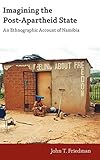Imagining the Post-Apartheid State : An Ethnographic Account of Namibia / John T. Friedman.
Material type: TextPublisher: New York ; Oxford : Berghahn Books, [2011]Copyright date: ©2011Description: 1 online resource (324 p.)Content type:
TextPublisher: New York ; Oxford : Berghahn Books, [2011]Copyright date: ©2011Description: 1 online resource (324 p.)Content type: - 9780857450906
- 9780857450913
- 968.8104 23
- GN657.N35 F75 2014
- online - DeGruyter
| Item type | Current library | Call number | URL | Status | Notes | Barcode | |
|---|---|---|---|---|---|---|---|
 eBook
eBook
|
Biblioteca "Angelicum" Pont. Univ. S.Tommaso d'Aquino Nuvola online | online - DeGruyter (Browse shelf(Opens below)) | Online access | Not for loan (Accesso limitato) | Accesso per gli utenti autorizzati / Access for authorized users | (dgr)9780857450913 |
Browsing Biblioteca "Angelicum" Pont. Univ. S.Tommaso d'Aquino shelves, Shelving location: Nuvola online Close shelf browser (Hides shelf browser)
Frontmatter -- CONTENTS -- List of Figures -- List of Abbreviations -- Acknowledgements -- INTRODUCTION -- Chapter 1 Imagining States -- Chapter 2 State Imaginings -- PART I GOVERN-MENTALITY IN KAOKOLAND -- Chapter 3 ‘How Do You Feeling about Freedom’ -- Chapter 4 The Art of Being Governed -- PART II COURTS, LAWS AND THE ADMINISTRATION OF JUSTICE -- Chapter 5 In the Matter of The State v. Custom -- Chapter 6 Judicial Statements -- Chapter 7 Legal States of Imagination and their Effect -- PART III CHIEFSHIP AND THE POST-APARTHEID STATE -- Chapter 8 Making Politics, Making History -- Chapter 9 ‘Tradition’, Authority and the State in Northern Kaokoland -- CONCLUSION -- Chapter 10 Towards an Ethnography of the (Namibian) State -- Notes -- References -- Index
restricted access online access with authorization star
http://purl.org/coar/access_right/c_16ec
In northwest Namibia, people’s political imagination offers a powerful insight into the post-apartheid state. Based on extensive anthropological fieldwork, this book focuses on the former South African apartheid regime and the present democratic government; it compares the perceptions and practices of state and customary forms of judicial administration, reflects upon the historical trajectory of a chieftaincy dispute in relation to the rooting of state power and examines everyday forms of belonging in the independent Namibian State. By elucidating the State through a focus on the social, historical and cultural processes that help constitute it, this study helps chart new territory for anthropology, and it contributes an ethnographic perspective to a wider set of interdisciplinary debates on the State and state processes.
Mode of access: Internet via World Wide Web.
In English.
Description based on online resource; title from PDF title page (publisher's Web site, viewed 25. Jun 2024)









